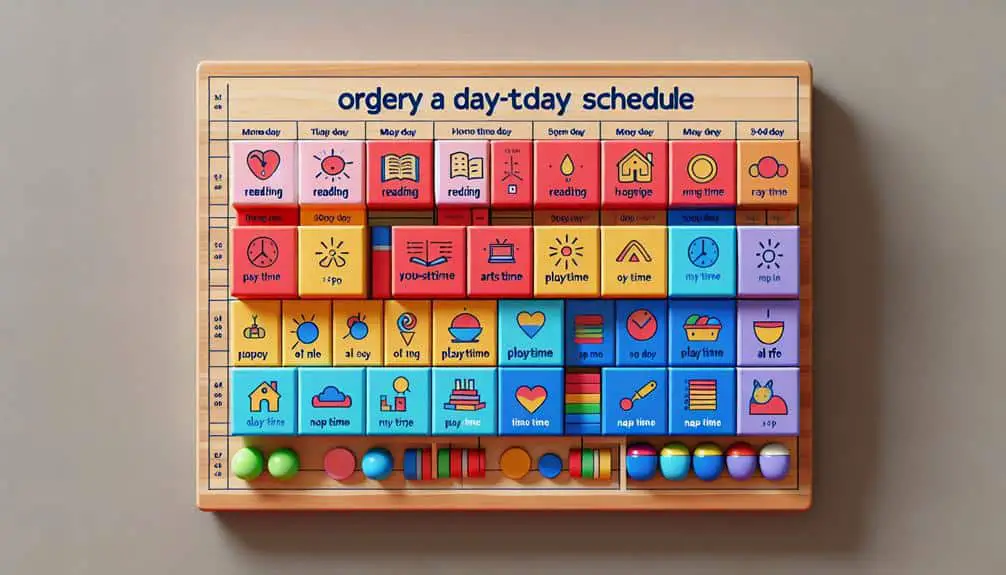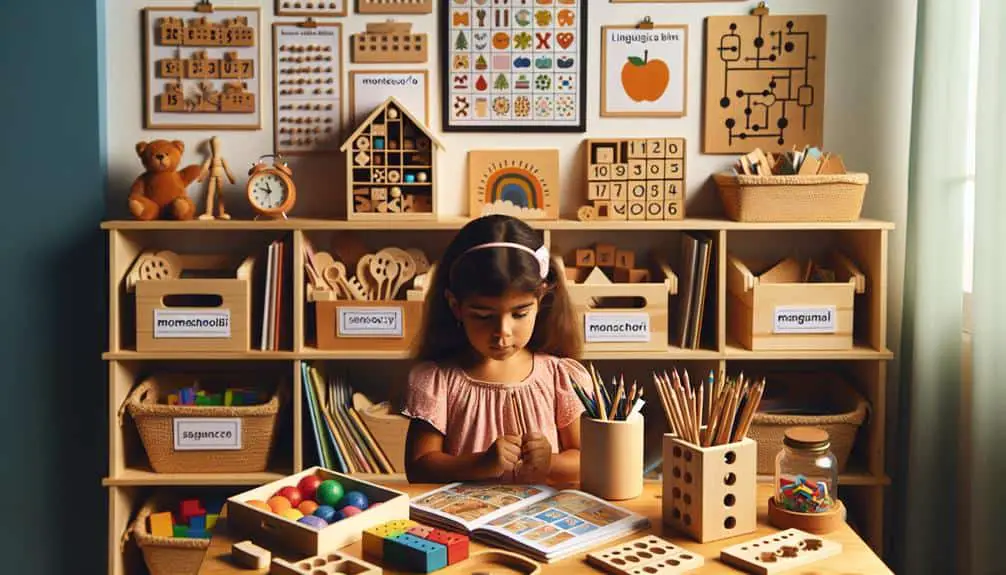Get the most out of homeschooling with your preschooler by creating a structured routine. Start with morning activities, like a healthy breakfast and simple games. Add in playtime full of sensory bins, art, and outdoor adventures. Mix learning and fun with creative crafts, music, and nature exploration. Enhance experiences with nature walks and easy science experiments. Balance screen time and outdoor play for a well-rounded day. Boost social skills with interactive games and virtual playdates. Your preschooler will thrive with a schedule tailored to their needs and interests. Remember, there's always more to discover!
Key Points
- Establish a structured daily routine with consistent schedules.
- Include a variety of learning activities like arts, sensory play, and music.
- Balance screen time with outdoor play and hands-on experiences.
- Encourage social interaction through group activities and virtual playdates.
- Incorporate nature walks and science experiments for hands-on learning.
Setting Daily Routine
Looking to create a structured day for your preschooler at home? Establishing consistent routines can help provide a sense of security and stability for your little one. Morning routines can kickstart the day positively. Encourage your preschooler to wake up at the same time each morning, followed by a healthy breakfast to fuel their activities. Incorporating simple activities like singing a morning song or reading a short story can add a fun touch to the routine.
Mealtime routines are essential for a preschooler's development. Set specific meal times to provide structure and make sure your child gets the necessary nutrition. Engage them in simple meal prep tasks to make mealtimes interactive and enjoyable.
Transitioning activities can help your preschooler move smoothly between tasks. Whether it's cleaning up toys before a meal or having a short playtime before bedtime, these routines signal upcoming changes, reducing resistance and tantrums.
Bedtime routines are important for winding down. Establish calming activities like reading a bedtime story or practicing deep breathing exercises to prepare your preschooler for a restful night's sleep. By incorporating these routines, you can create a predictable and comforting environment for your preschooler at home.
Incorporating Playtime
Ready to add some fun to your homeschool schedule?
Playtime isn't just about having a blast – it's essential for your little one's development.
Through structured play activities and outdoor adventures, your preschooler will learn, grow, and thrive!
Importance of Play
Incorporating playtime into your preschooler's homeschool schedule isn't just fun; it's an essential component of their learning and development. Play-based learning is vital for preschool development as it nurtures cognitive growth and enhances social skills.
When your child engages in imaginative play, they aren't only having a great time but also sharpening their problem-solving abilities and creativity.
Through play, children learn to navigate social interactions, take turns, negotiate, and communicate effectively with their peers. These social skills are fundamental building blocks for future relationships and collaborations.
Play also supports cognitive development by stimulating the brain, promoting curiosity, and improving memory and concentration.
Structured Play Activities
To enhance your preschooler's homeschool experience, consider introducing structured play activities that promote learning through fun and interactive experiences.
Structured play activities can encourage creative exploration and sensory experiences, helping your child develop important skills while having a blast.
Here are some ideas to incorporate into your homeschool schedule:
- Sensory Bins: Fill containers with various materials like rice, beans, or sand for your child to touch, feel, and explore different textures, enhancing their sensory development.
- Art Corner: Set up a designated area with art supplies for imaginative play and artistic expression. Let your child paint, draw, and create freely to nurture their creativity.
- Dress-Up Time: Encourage role-playing by providing costumes and props, allowing your child to engage in pretend play and explore different characters and scenarios.
- Building Blocks: Use building blocks or LEGO sets to promote problem-solving skills and spatial awareness, fostering cognitive development through hands-on construction activities.
Incorporating these structured play activities can make learning engaging and enjoyable for your preschooler, enriching their educational journey at home.
Outdoor Play Opportunities
Get your preschooler ready to explore and have fun outdoors with a variety of play opportunities that will keep them active and engaged. Nature exploration and backyard adventures are fantastic ways to incorporate outdoor play into your homeschool schedule. Encourage your little one to observe insects, birds, and plants, fostering a love for the natural world.
Sensory play is key for preschoolers, so set up a small sandbox or water table for tactile experiences. Let them dig, pour, and splash to their heart's content. These activities not only engage their senses but also aid in their development of fine motor skills.
For gross motor skills, consider setting up an obstacle course using everyday items like hula hoops, cones, and ropes. This will challenge your preschooler's physical abilities while keeping them entertained. Don't forget to join in the fun; your participation will make the outdoor playtime even more enjoyable for your little one.
Including Learning Activities
Ready for some exciting learning adventures with your little one?
Get ready for engaging learning activities that will spark curiosity and creativity.
From interactive play ideas to hands-on educational fun, your preschooler will love every moment of their homeschool schedule!
Engaging Learning Activities
Engage your preschooler in fun and interactive learning activities to spark their curiosity and foster a love for learning. Here are some exciting activities that will captivate your little one's imagination:
- Creative Crafts: Set up a crafting station with colorful papers, child-safe scissors, glue, and stickers. Encourage your child to create their masterpiece, allowing them to explore their creativity freely.
- Sensory Play: Fill a bin with items like rice, beans, or sand for sensory exploration. Add scoops, small containers, and toys to enhance the tactile experience.
- Music and Movement: Have a mini dance party where your child can move freely to different types of music. Incorporate simple instruments like shakers or drums for added fun.
- Nature Exploration: Take a nature walk in your backyard or a nearby park. Collect leaves, rocks, or flowers and discuss their colors, shapes, and textures with your preschooler.
These engaging activities won't only entertain your child but also provide valuable learning experiences in a playful and interactive way.
Interactive Play Ideas
Explore a world of interactive play ideas that will ignite your preschooler's imagination and foster their love for learning through engaging activities.
Encourage sensory exploration by setting up a tactile bin filled with rice, beans, or sand for your child to dig through and discover hidden treasures.
Engage in creative expression by providing art supplies like crayons, paints, and stickers for your little one to create masterpieces that reflect their unique perspective.
Imaginative play can transport your child to magical worlds where they can be anything they dream of.
Set up a pretend play area with costumes, puppets, or props to encourage storytelling and role-playing.
Encouraging physical movement is essential for your preschooler's development.
Plan fun activities like a dance party, an obstacle course, or a nature scavenger hunt to get them up and moving while learning through play.
These interactive play ideas won't only keep your child entertained but also help them develop important skills in a fun and engaging way.
Hands-On Educational Fun
Looking for hands-on educational fun to spark your preschooler's curiosity and learning? Engaging in activities that combine creativity and exploration can make learning exciting.
Here are some ideas to incorporate into your homeschool schedule:
- Creative Crafts: Encourage your little one to express themselves through art. Provide various materials like paints, crayons, and playdough for them to create masterpieces.
- Sensory Exploration: Set up sensory bins with items like rice, beans, or water for tactile experiences. Let them explore different textures and sensations.
- Nature Walks: Take a stroll outside to observe nature up close. Collect leaves, rocks, or flowers to discuss later and learn about the environment.
- Science Experiments: Conduct simple experiments at home to introduce basic scientific concepts. Watch their eyes light up as they observe cause and effect in action.
Balancing Screen Time
Monitor the amount of time your preschooler spends in front of screens to maintain a healthy balance of activities throughout the day. Setting screen time limits and incorporating technology breaks can help prevent overexposure.
It's crucial to make sure your little one enjoys a digital detox to engage in outdoor exploration and hands-on activities.
Encouraging your preschooler to take breaks from screens and explore the outdoors can enhance their learning experiences. Limiting screen time allows for more time spent on interactive, sensory activities that promote creativity and physical movement.
Consider scheduling specific times for technology use and balance it with outdoor play, which can boost their cognitive and motor skills.
Utilizing Outdoor Time
Encouraging your preschooler to step outside and immerse themselves in outdoor activities can provide them with valuable opportunities to learn and play in a natural environment.
Here are some fun ways to make the most of outdoor time:
- Nature Exploration:
Take a nature walk in your backyard or a nearby park. Encourage your little one to observe the trees, flowers, insects, and birds they encounter. Ask them questions about what they see to spark curiosity and learning.
- Sensory Activities:
Set up a sensory bin with items like sand, water, or dried leaves. Let your child dig, pour, and feel the different textures. This hands-on experience can enhance their sensory development and creativity.
- Outdoor Games:
Play classics like tag, hide-and-seek, or hopscotch in your outdoor space. These games promote physical activity, coordination, and social skills.
- Imaginative Play:
Encourage your preschooler to role-play as a chef in a pretend outdoor kitchen or a scientist exploring the backyard. Imaginative play fosters creativity and problem-solving skills while having fun outdoors.
Emphasizing Social Interaction
Engage your preschooler in social interactions through fun and interactive activities that promote communication and cooperation skills. Group activities are a fantastic way to encourage social skills and peer interaction.
Set up virtual playdates with other homeschooling families to provide opportunities for your little one to engage with peers. Whether it's a virtual storytime session or a fun arts and crafts activity over video call, these interactions can help build important social skills.
Encouraging your child to participate in group activities can also boost their confidence and teamwork abilities. Simple games like Simon Says or musical chairs can be adapted for small groups at home. These activities not only provide social stimulation but also help in developing essential communication and cooperation skills.
Adjusting for Flexibility
To guarantee a successful homeschool schedule for preschoolers, it's important to be adaptable and open to adjusting activities as needed to accommodate their ever-changing interests and energy levels. Building flexibility into your routine and being willing to adjust expectations can make the learning experience more enjoyable and effective for both you and your little one.
Here are some tips to help you navigate this dynamic preschool homeschooling journey:
- Customizing Curriculum: Tailor activities to your child's interests and learning style to keep them engaged and excited about learning.
- Adapting Environment: Create different learning spaces within your home that cater to various activities, such as a cozy reading nook or a designated art corner.
- Being Open to Change: Embrace spontaneity and be ready to switch gears if a particular activity isn't capturing your child's interest that day.
- Adjusting Expectations: Understand that each day may bring its unique challenges and victories, so be patient and flexible with your schedule to accommodate these fluctuations.
Frequently Asked Questions
How Can I Manage Teaching Multiple Preschool-Aged Children at Once?
To manage teaching multiple preschool-aged children at once, focus on time management for individual attention. Engage in group activities for cooperative learning. Rotate between structured lessons and free play. Keep it fun and interactive to make learning memorable and enjoyable.
What Are Some Creative Ways to Keep My Preschooler Engaged in Learning Activities?
You think keeping your preschooler engaged is a breeze? Just wait until you try fun, interactive learning activities like educational crafts and engaging playtime. Watch their eyes light up with excitement and curiosity!
Are There Recommended Educational Apps Suitable for Preschoolers?
When looking for educational apps for preschoolers, remember to set screen time limits and provide parental supervision. You can explore interactive apps that offer engaging activities aligned with early learning milestones, making education fun and accessible.
How Can I Ensure My Preschooler Is Getting Enough Physical Activity Indoors?
To guarantee your preschooler gets enough physical activity indoors, engage in fun indoor exercises like animal movements or dance parties. Get creative with games that involve sensory play, such as obstacle courses or scavenger hunts.
What Strategies Can I Use to Encourage Social Interaction With Other Children?
To encourage social interaction with other children, you can organize outdoor playdates for your preschooler. Additionally, joining virtual playgroups can help develop social skills. Don't forget about sibling interactions, they are great for fostering social growth!



